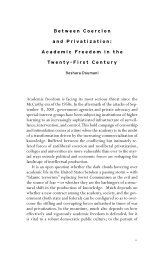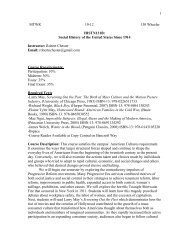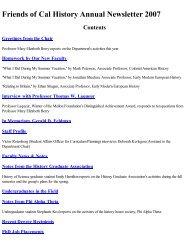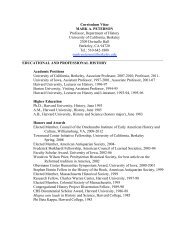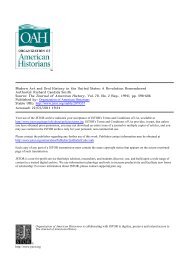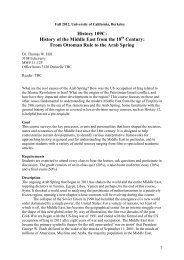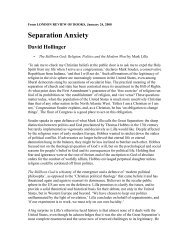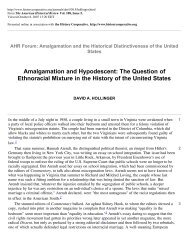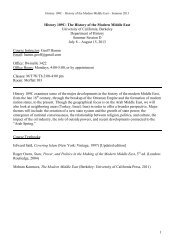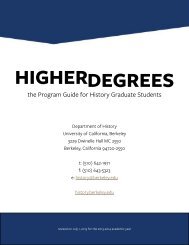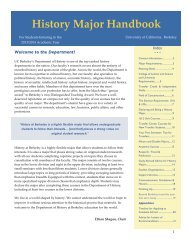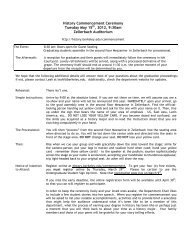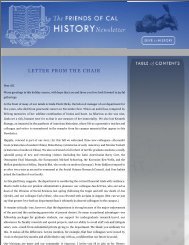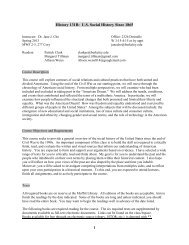My Grandmother and Other Stories: Histories of the Palestinians as ...
My Grandmother and Other Stories: Histories of the Palestinians as ...
My Grandmother and Other Stories: Histories of the Palestinians as ...
You also want an ePaper? Increase the reach of your titles
YUMPU automatically turns print PDFs into web optimized ePapers that Google loves.
throughout M<strong>and</strong>ate Palestine. Following <strong>the</strong> death <strong>of</strong> his mo<strong>the</strong>r, <strong>the</strong> sheikh’s<br />
son, Ghazi, w<strong>as</strong> raised by his uncle Abdullah. I have not been able to collect much<br />
information about this period, for Abdullah died <strong>as</strong> a young man in 1967. His<br />
memories <strong>of</strong> his bro<strong>the</strong>r, Sheikh H<strong>as</strong>san, were not p<strong>as</strong>sed on to his children due to<br />
<strong>the</strong>ir young age <strong>and</strong> <strong>the</strong> sudden break in communications with Sheikh H<strong>as</strong>san, <strong>as</strong> we<br />
shall now see.<br />
Akko fell into <strong>the</strong> h<strong>and</strong>s <strong>of</strong> Zionist forces on 18 May, 1948, <strong>and</strong> <strong>the</strong> al-Labadi family<br />
w<strong>as</strong> prevented from visiting Sheikh H<strong>as</strong>san because <strong>the</strong>y lived in an area that came<br />
to be known <strong>as</strong> <strong>the</strong> ‘West Bank’ controlled by Jordan. The family w<strong>as</strong> unable to learn<br />
<strong>the</strong> sheikh’s fate, ei<strong>the</strong>r through <strong>the</strong> Red Cross or any o<strong>the</strong>r means. They considered<br />
him among <strong>the</strong> lost, in <strong>the</strong> best c<strong>as</strong>e scenario, or among <strong>the</strong> dead, in <strong>the</strong> worst. His son<br />
Ghazi grew up <strong>and</strong> moved to Amman for work, <strong>and</strong> <strong>the</strong> sheikh’s bro<strong>the</strong>r died during<br />
<strong>the</strong> June 1967 war, leaving behind a h<strong>and</strong>ful <strong>of</strong> children, <strong>the</strong> oldest <strong>of</strong> whom w<strong>as</strong><br />
only 18. People were <strong>the</strong>reafter preoccupied with <strong>the</strong> difficulties <strong>of</strong> life under Israeli<br />
occupation, <strong>and</strong> had no time to consider Sheikh H<strong>as</strong>san or anything related to him.<br />
Ghazi didn’t come from Amman to Jerusalem except for important occ<strong>as</strong>ions, such <strong>as</strong><br />
my wedding. I had never heard <strong>the</strong> story <strong>of</strong> his fa<strong>the</strong>r <strong>and</strong> his disappearance. No one<br />
had ever mentioned it in front <strong>of</strong> me; I don’t know why. It may have been completely<br />
forgotten, or it may have been simply that no one, o<strong>the</strong>r than my mo<strong>the</strong>r-in-law, had<br />
known Sheikh H<strong>as</strong>san personally. Nothing that I heard suggested any anomaly or open<br />
question. The wheel <strong>of</strong> life crushed us all, <strong>and</strong> <strong>the</strong> worries <strong>of</strong> living under occupation<br />
did not leave us free for o<strong>the</strong>r concerns. If <strong>the</strong>y existed, <strong>the</strong>y were marginalized<br />
entirely. The al-Labadi family, in particular Abdullah’s children, became closely<br />
connected to <strong>the</strong> Palestinian cause <strong>and</strong> national resistance at an early age, starting in<br />
<strong>the</strong> early 1970s. The family’s agenda no longer had room for anything else.<br />
Act Two<br />
On a rainy January night in <strong>the</strong> winter <strong>of</strong> 1982, my wife Haifa’ <strong>and</strong> I were on an ordinary<br />
visit to her family in Abu Dis. The large family, its numerous spouses <strong>and</strong> <strong>the</strong>ir children,<br />
ga<strong>the</strong>red around <strong>the</strong> g<strong>as</strong> heater called ‘Aladdin’. Our ga<strong>the</strong>rings were never free <strong>of</strong><br />
national concerns. Until <strong>the</strong> wee hours <strong>of</strong> <strong>the</strong> morning, we would talk about where we<br />
were, who among us w<strong>as</strong> in prison, <strong>and</strong> which <strong>of</strong> us w<strong>as</strong> a c<strong>and</strong>idate for arrest. Like<br />
many o<strong>the</strong>r ‘political’ families, imprisonment w<strong>as</strong> a common <strong>the</strong>me in <strong>the</strong> fate <strong>of</strong> <strong>the</strong><br />
al-Labadi family. During <strong>the</strong> 1970s, it had become customary for marriage to take place<br />
within political organizations, a practice known <strong>as</strong> ‘inner-marriage’. This streng<strong>the</strong>ned<br />
political ties, on <strong>the</strong> one h<strong>and</strong>, but incre<strong>as</strong>ed family problems on <strong>the</strong> o<strong>the</strong>r, since it w<strong>as</strong><br />
not unusual for many members <strong>of</strong> an extended family <strong>and</strong> <strong>the</strong>ir spouses to be detained at<br />
<strong>the</strong> same time. It certainly w<strong>as</strong> not unusual in our c<strong>as</strong>e.<br />
[ 12 ] HISTORICAL FEATURES Sheikh H<strong>as</strong>san al-Labadi & Seven Acts <strong>of</strong> Lost Memory



